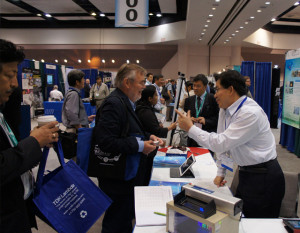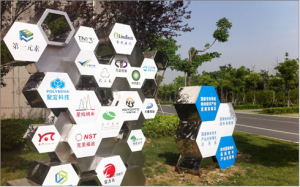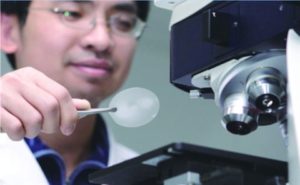Nanotechnology in China is being rapidly developed by 300 companies and more than 3,000 researchers in China. Thanks to the support of more than 50 universities and 20 research centres in the Chinese Academy of Science, China has the largest number of newly registered nanotech companies in the world. However, recently nanotechnologies have seriously disappointed investors with a drastic drop of 82.6% in the value of the nanotech industry in the three last years. Despite this, the main reason for the drop has been identified as a failure to apply the technology being developed to industrial products in China.
The industry still remains at an estimated 2.6 trillion RMB, largely on the promise of industrial applications still to be developed. Nanotechnology covers three separate segments: nano-electronic nano-biotechiotech and medicine, and nano materials and devices. In China, nano materials are developing a lot faster than other segments since they are safe investments and don’t require as much time for development. For example, nano cemented carbide is expected to become widely used in China, and is currently facing a demand valued at 2 billion RMB. Despite nano-material’s rapid growth, they still lack strict quality standards. High-end nano-electronic devices and biotech remain in very high demand and could represent an ideal opportunity for foreign companies.
China’s Nanotech world influence
China’s nanotechnology development is rapidly growing in the field. Suzhou is the largest nanotech industrial city in the world, largely thanks to the establishment of Nanopolis, the world’s largest multifield nanotech industrial community. It is estimated that about 20% of nanotechnology patent applications belong to China. By the end of 2010, there were about 10,000 nano-material and 9,000 nano-electronic patent applications in China. Most of patent applications cover nanotech materials and nano-electronic devices. The largest player is Samsung, owning the most patents in nanotech: 147 for nano-electronic parts and 119 for nano-materials. However, Philips owns more patents in other fields: 117 for biotech and medicine, and 99 for nano devices.
The annual growth rate of nanotechnology is forecasted to continue increasing by 15% in 2017, powered by a growth rate of 30% for nanotechnology in the construction field, the result of China’s boom in real estate and construction industry. The future growth of the industry will be ensured by government support; according to the government’s technology and science schedule, nanotech is one of the four prioritized technologies.
Advantages for Chinese nanotechnology researchers
China has a real international competitive advantage in nanotech industry. The industry can count on domestic sales to be highly rewarding. The increasing interest from companies in developing nanotech and modern communications is expected to enable high return on investment. Developing nanotechnology in China also has the advantage of being able to establish large scale production facilities and will as a result reach competitive prices compared to other companies. In China, environmental regulations and bioethics are developing rapidly, creating a window in which nanotech can develop faster than other countries and corporations as the field matures and establishes itself. However, there are currently no Chinese mainland corporations in the list of top 10 nanotech firms in the world. Many small firms are competing in one of 3 main nanotech cities (Beijing, Shanghai and Shenzhen), while larger corporations continue to grow and slowly start to dominate the market.
Small local companies embracing new opportunites for nanotechnology in China
As nanotech is getting better understood by the international scientific community, many opportunities are arising despite some difficulties in applying the technology to industry. Several domestic corporations specializing in developing nanotechnology in China are growing fast by selecting specific materials or industries to focus on. Amongst them, Nanfeng Chemical, will be producing carbon nanotubes that are 300 times stronger than steel with an extremely low density. The company is now cooperating with Tsinghua University, one of the best Chinese universities to deliver industry-applicable products in the near future. Nanjiang Group is also investing large amounts in nanotech: the group recently spent 200 million RMB on purchasing new technology to produce 30 tons of graphen every year. The material is estimated to increase the market value by 1 trillion RMB.
 Chinese companies are advancing quickly in the production of the supermaterial fullerene. A corporation in Xiamen, 2011 FUNA, is now capable of producing 0.5 grams of fullerene daily. This molecule has anti-aging functions with the ability to outperform certain vitamins 100 times. The development of nanotech will enable companies to revolutionize Chinese Traditional Medicine as well. The technology lets scientists identify and replicate the most efficient molecules TCM and improve the vitamins and dietary supplements results, while removing the negative side-effects. People’s health will be enhanced significantly as these new product make their appearance on the market. Furthermore nanotech can participate to reduce water and air pollution at nano scale thanks to nano catalysts.
Chinese companies are advancing quickly in the production of the supermaterial fullerene. A corporation in Xiamen, 2011 FUNA, is now capable of producing 0.5 grams of fullerene daily. This molecule has anti-aging functions with the ability to outperform certain vitamins 100 times. The development of nanotech will enable companies to revolutionize Chinese Traditional Medicine as well. The technology lets scientists identify and replicate the most efficient molecules TCM and improve the vitamins and dietary supplements results, while removing the negative side-effects. People’s health will be enhanced significantly as these new product make their appearance on the market. Furthermore nanotech can participate to reduce water and air pollution at nano scale thanks to nano catalysts.
As a final sign of China’s growing influence on the nanotech industry, the 6th International Conference on Nanoscience and Technology will be held in Beijing in September 2015/ This event will be an ideal opportunity to learn more about the market in China and connect with this market full of opportunities. Daxue Consulting will provide updates when the event has concluded.
Interested in learning more about innovations in China? Follow us on Twitter:
How innovations in #China will change the world: From Artificial Intelligence to #mpayment https://t.co/Ne76zybkJF pic.twitter.com/ZlvQq7fz7q
— Daxue Consulting (@DaxueConsulting) August 18, 2017





